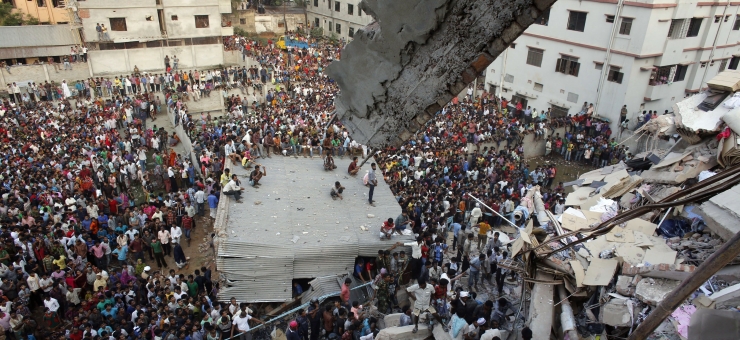International Workers Memorial Day remembers Dhaka victims

Sunday 28th April is International Workers' Memorial Day which commemorates all the men and women who have died from work-related deaths, injuries and occupational related illness.
UNI Global Union General Secretary Philip Jennings said, “It is tragic and unacceptable that the number of victims we are remembering today has been greatly added to by the hundreds who have lost their lives in the Dhaka building collapse earlier this week. The building, by all accounts a death trap, was used by garment workers producing clothes for Western brands. Walmart is investigating whether its suppliers were operating in the building. It’s indicative of Walmart’s irresponsible attitude that they do not know one way or the other and shows how small a value they put on the lives of the workers producing their goods in Asia.”
Jennings continued, “Bangladesh’s press has called what happened at the factory “mass-murder by the rich” and they are not wrong. The people are protesting in the street and they have the right to be angry. These factories are not properly regulated. Health and safety is non-existent while the factory owners demand every last ounce of flesh from their workers to maximise profits. But the real winners are the multinationals like Walmart who are able to sell their goods to consumers at rock bottom prices. Someone has to pay the price though. Who’s next after the dead workers of Dhaka this week, and those killed in garment factory fire also in Bangladesh only five months ago? Those directly responsible for the Dhaka tragedy must be punished. The multinationals involved also have the moral responsibility to make sure their suppliers are providing a safe working environment for their employees and paying them a living wage. These companies are failing on both accounts and yet they have the financial clout to ensure building safety and a decent wage, without hardly touching their bottom line. What is needed is more regulation to force these giant Western companies as well as the suppliers to fall in line and protect workers' rights. It is time to clean up the supply chain. ”
Bangladesh has one of the biggest garment industries in the world, providing cheap clothing for multinational Western retailers who benefit from its low cost labour force. The industry has been widely criticised for its rock bottom wages, lack of workers rights and dangerous working conditions. There are reports that extra floors are routinely added to buildings illegally to increase capacity. The workers in the factories are mainly women who are contracted to work eight hours a day but forced to work 18 hours a day, even on their day off, to complete orders for Western companies like Walmart.

